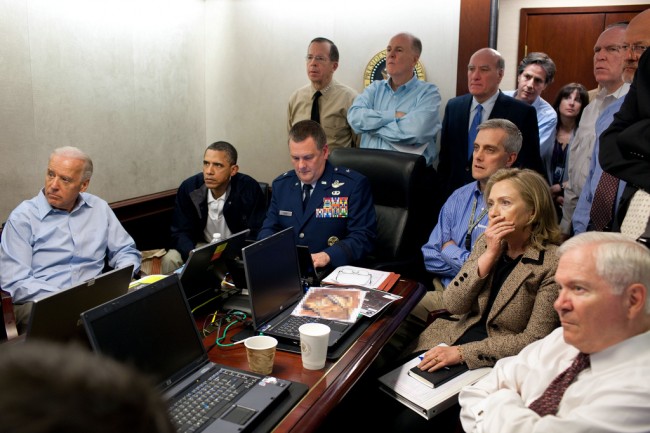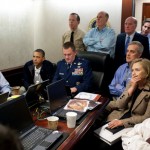
The “War on Terror”: One Year On
One year ago, Osama bin Laden was killed in a daring nighttime raid by Navy SEALs on his compound in a small military garrison town in Pakistan. Since then, how has the war on terror changed? Should we be looking at it more critically than we are?
In this essay collection, we examine the war on terror from several angles not often found in the popular discourse.
In the collection, below and you can download it here, Bernard Finel wonders if we know how well we’re doing. Measuring our progress in the global struggle against Islamist terrorism is not simple. Government officials now openly say the war is over [1], even while Islamist violence is at historically high levels.
Matthew Wallin explains how terrorist groups have revolutionized public messaging, as well as how the U.S. has struggled to keep pace with them.
Carolyn Deady tries to see if American public opinion has arrived at a common belief for how the war is going (it hasn’t).
August Cole examines a topic few ever discuss in any detail – the incredible growth of the counterterrorism industry. Private companies have been enlisted in the fight against terrorism, with little oversight and enormous budgets on hand. It’s not an easy phenomenon to understand, coming at the same time as shrinking defense budgets and a shift from large wars to smaller conflicts.
Terri Lodge and Bryan Gold note that the flagging progress on global nuclear security issues mean the threat of loose nukes or nuclear material is as frightening as it ever has been.
Randy Law looks at the history of how the U.S. responds to terrorism, and its refusal to learn from its own mistakes. The result, he argues, is a constant war, where we must constantly relearn the same lessons.
Joshua Foust asks what kind of apparatus we’re building to combat terrorism in our borders. There are a growing number of trials that boil down to convicting people of thought crimes, of merely supporting terrorism rather than actively engaging in it. What does that mean for us as a country?
And finally, Brigadier General John Adams USA (Ret.) mentions one topic so outside the box that it’s almost never mentioned: negotiating. America does not negotiate with terrorists, or so we say. But, Adams argues, maybe we should – especially if it would help us diminish the problem.
You can read the collection below and can download it here
The War on Terror: One Year On
[1] http://decoded.nationaljournal.com/2012/04/can-obama-safely-embrace-islam.php









[…] You can find the collection here […]
[…] week ASP release a collection of essays on the War on Terror, marking on year since the death of Osama bin […]
[…] with the threat of terrorism in the west. None of the experts can agree how big that risk remains and it is therefore impossible for outsiders to judge whether the drone strikes are proportional to […]
[…] and the military that elicited President Dwight Eisenhower’s cautionary address of 1961. See my essay, “The Explosive Growth of the Counterterrorism Industrial Complex,” in The … This legacy, just like nagging questions about how we should project power while safeguarding our […]
[…] with the threat of terrorism in the west. None of the experts can agree how big that risk remains and it is therefore impossible for outsiders to judge whether the drone strikes are proportional […]
[…] The War on Terror: One Year On […]
[…] opinion about the War on Terror. This piece was also featured in our latest collection of essays The War on Terror: One Year On. The death of bin Laden, the most wanted man in the world, had the approval of a majority of […]
[…] The War on Terror: One Year On […]
[…] The War on Terror: One Year On […]
[…] to out-communicate the United States. In April, I wrote about this in greater detail in ASP’s “The War on Terror” One Year On. During these conflicts, insurgents and terrorists were able to effectively challenge the American […]